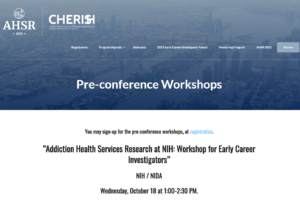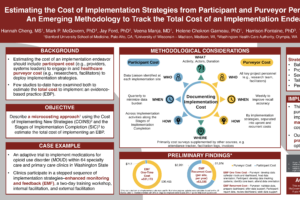SAVE THE DATE! Addiction Health Services Research Conference
The Center for Dissemination and Implementation (CDI) at Stanford University School of Medicine is honored to host the Addiction Health Services Research (AHSR) conference, October 16-18, 2024, in San Francisco, CA. Join us at the historic Palace Hotel in the beautiful and bustling city of San Francisco and sign-up for updates about the conference.
NEW! Implementation Guides and Measures
The Center for Dissemination & Implementation At Stanford (C-DIAS) and the Research Adoption Support Center (RASC) recently developed a set of implementation guides and measures to support researchers and anyone seeking to evaluate or implement a health care innovation.
C-DIAS preconference workshop at Addiction Health Services Research annual meeting in NYC
Register for C-DIAS’s preconference workshop! This interactive workshop will introduce key concepts and methods of implementation science.
C-DIAS Article Selected for Editor’s Choice!
A recent article produced by C-DIAS leadership has been selected for the Psychiatric Services Editor’s Choice! To see the full compilation of the Editor’s Choice and to read the C-DIAS piece, visit the Psychiatric Services website today.
Meet C-DIAS’s First Cohort of Dissemination and Implementation Fellows!
The C-DIAS Fellowship in Addiction Dissemination and Implementation (D&I) Science is designed for early or mid-career individuals who have a goal of using rigorous methods in D&I science to improve public access to high-quality addiction treatment. The 2023-2024 inaugural cohort consists of seven promising individuals whose research projects span a variety of topics including culturally-adapted substance use treatments, stigma-reduction, effectiveness of digital toolkits, and so much more!
Remarkably efficient approach to improving addiction services in primary and specialty care
This protocol paper describes a stagewise implementation-to-target (stepped “care” type) approach to implement MOUD whereby organizations engage in increasingly intensive implementation strategies as needed.
The slow rise of implementation science to address the US opioid epidemic
Written by members of the C-DIAS team, this paper assessed how implementation research has been used in the National Institute on Drug Abuse (NIDA) efforts to address the opioid and stimulant epidemics.
C-DIAS innovations in research methods presented at national conference in DC
C-DIAS presented two posters at the 15th Annual Conference on the Science of Dissemination and Implementation in Health. One poster studied participant engagement in implementation trials, and the other described a micro-costing approach to estimating the total cost to implement an evidence-based practice.
An examination of NIDA-funded implementation research on treatments for SUD
Written by members of the C-DIAS team, this paper assessed how implementation research has been used in the National Institute on Drug Abuse (NIDA) efforts to address the opioid and stimulant epidemics.
A study of a procedure to expand access to addiction medication
Though significant national campaigns have been launched to expand access to medications for opioid use disorder (MOUD), research has yet to properly address the challenges of implementing and sustaining MOUD in specialty addiction programs. This protocol paper describes a stagewise implementation-to-target (stepped “care” type) approach to implement MOUD whereby organizations engage in increasingly intensive implementation strategies as needed.











